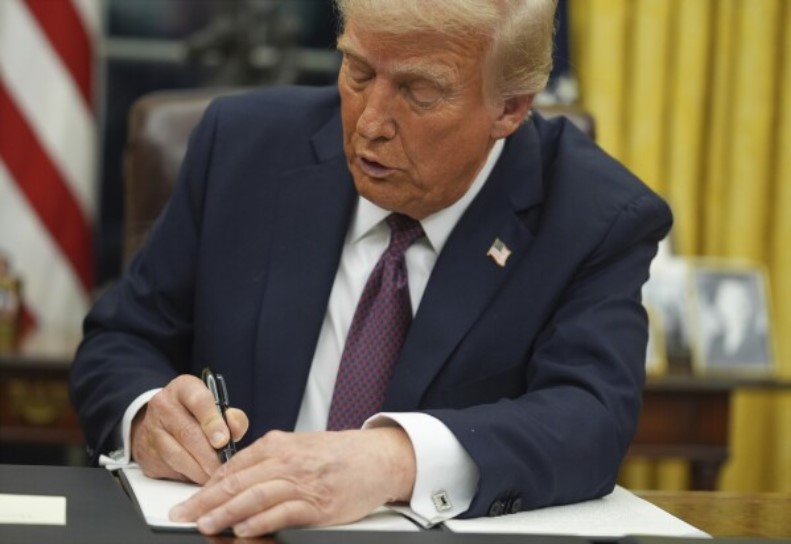In a development that has taken many by surprise and caused a stir in both legal and political circles, two prominent law professors have written an opinion piece in The New York Times, suggesting that President Trump may have a valid legal argument to end birthright citizenship for the children of illegal immigrants. This opinion, presented by professors from Georgetown Law School and the University of Minnesota, challenges long-standing interpretations of the 14th Amendment’s Citizenship Clause and has already created a wave of controversy. The idea that birthright citizenship could be redefined by legal means may lead to a monumental showdown in the U.S. Supreme Court, potentially reshaping an essential aspect of American constitutional law.
For decades, the interpretation of the 14th Amendment has been relatively settled, with the Citizenship Clause serving as the cornerstone for granting U.S. citizenship to all persons born on American soil. The clause reads: “All persons born or naturalized in the United States, and subject to the jurisdiction thereof, are citizens of the United States and of the state wherein they reside.” When it was originally drafted, the Citizenship Clause was aimed at securing citizenship for the children of formerly enslaved people, ensuring that they were fully integrated into the post-Civil War social and legal framework. Over time, however, the interpretation expanded to include all children born in the U.S., regardless of the legal status of their parents.
But this legal consensus is being seriously questioned. In their op-ed, Professors John Eastman of Chapman University and Professor Ilan Wurman of Arizona State University argue that the original intent of the Citizenship Clause did not extend to children of illegal immigrants. They assert that the clause’s language should be understood in the context of the legal and social environment in which it was created. According to their analysis, the Citizenship Clause was designed for children whose parents were lawfully within the United States or had pledged allegiance to U.S. laws. They point out that the phrase “subject to the jurisdiction thereof” was never intended to apply to foreign nationals who entered the country unlawfully.
The professors raise a provocative question in their analysis: “Has a citizen of another country who violated the laws of this country to gain entry and unlawfully remain here pledged obedience to the laws in exchange for the protection and benefit of those laws?” Their answer is a resounding “no.” They argue that the parents of these children, who have entered the country illegally, have not shown the required allegiance or commitment to U.S. laws. In their view, citizenship under the 14th Amendment was always meant to extend to those who show loyalty and submission to American law—criteria that are not met by those who defy immigration laws to gain entry.
This argument directly challenges the view held by most courts, which have held that the Citizenship Clause provides automatic citizenship to anyone born on U.S. soil, regardless of their parents’ immigration status. Under this interpretation, children born in the United States to parents who are not citizens or legal residents are still granted citizenship at birth. The professors argue, however, that the long-standing judicial precedent is rooted in a misunderstanding of the historical and legal context of the 14th Amendment’s framers.
The proposal put forth by the professors is significant for several reasons. It suggests that, contrary to popular belief, the issue of birthright citizenship has not been definitively settled. Rather, it raises the possibility that a new interpretation of the 14th Amendment could have far-reaching implications, particularly in the ongoing debate over illegal immigration. President Trump, who has long advocated for an overhaul of the U.S. immigration system, has already made attempts to end birthright citizenship through executive action, though those efforts have been stymied by legal challenges.
If this argument gains traction, it could lead to a major legal battle, potentially forcing the U.S. Supreme Court to revisit the issue. A ruling in favor of the professors’ interpretation of the 14th Amendment would likely invalidate birthright citizenship for the children of illegal immigrants, a move that could dramatically alter the landscape of immigration law in the United States. While this development has energized conservative supporters of stricter immigration policies, it has also alarmed liberal legal experts who see it as a direct threat to established constitutional principles.
In conclusion, this opinion piece has initiated a conversation that could lead to a major legal battle, with the potential to reshape U.S. constitutional law. If the interpretation of the 14th Amendment is redefined to exclude children of illegal immigrants, it would be a historic shift, one that could redefine what it means to be an American citizen and potentially set the stage for a broader reckoning with immigration policy in the United States. Whether this theory will hold up in the courts remains to be seen, but it is clear that the debate over birthright citizenship is far from over.
